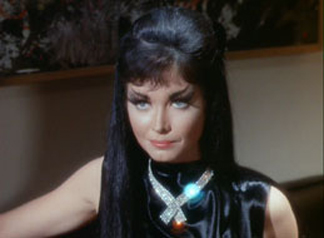Gary 7 never should have happened.
Bite your tongue. That was always one of my favorite episodes.
(Surprise, surprise.)
Hey, there's no accounting for taste.

Gary 7 never should have happened.
Bite your tongue. That was always one of my favorite episodes.
(Surprise, surprise.)

I'm glad we have "Assignment: Earth," because it's led to several of your best tie-in novels, Greg, but it's such a weird episode. It's hardly an installment of STAR TREK at all. Kirk, Spock, and the rest are like guest stars on their own show.
And don’t forget Isis. Nice kitty . . .. . . And, obviously, I was always disappointed that we never got to see more Gary Seven and Roberta.

And don’t forget Isis. Nice kitty . . .. . . And, obviously, I was always disappointed that we never got to see more Gary Seven and Roberta.

And don’t forget Isis. Nice kitty . . .. . . And, obviously, I was always disappointed that we never got to see more Gary Seven and Roberta.

Who was recently arrested for attempting to murder her boyfriend . . . for real!

One key part of this dialogue is that Earth actually had more than three world wars. It wouldn't take much to differentiate the Eugenics Wars from World War III.From "Bread And Circuses":
SPOCK: They do seem to have escaped the carnage of your first three world wars, Doctor.
MCCOY: They have slavery, gladiatorial games, despotism.
SPOCK: Situations quite familiar to the six million who died in your first world war, the eleven million who died in your second, the thirty seven million who died in your third. Shall I go on?
In TWOK, Khan specifies 1996 as the year they left Earth.From "Space Seed":
SPOCK: Hull surface is pitted with meteor scars. However, scanners make out a name. SS Botany Bay.
KIRK: Then you can check the registry.
SPOCK: No such vessel listed. Records of that period are fragmentary, however. The mid 1990s was the era of your last so-called World War.
MCCOY: The Eugenics Wars.
Replacing Jeffrey Hunter was MAJOR stumble, but it doesn't matter much since TOS is no longer canon.

A lot of times, it was too obvious when they were trying to make a point of something. Adding Chekov, a Russian TV good guy character at the height of the Cold War, wasn't so bad.
I'd say it wasn't bad at all. Showing that The Cold War would not last forever was a good and optimistic thing. Art need not be culturally neutral: despite my complaint about Sulu and Uhura above, I'd much rather have a self-cosciously inclusive Trek than one that "forgets" that non-white people exist. Star Trek was, however slightly, a force for good in this respect.
Indeed: years ago, when DS9 was in its final seasons, I was unpacking books in the "sort room" of the old Borders Books in Center City, Philadelphia. I was listening to the NPR (and this was years before 9-11) and the guy being interviewed was talking about negative impressions of Muslims in the media. When he asked if the moderator could think of a single positive Arab or Muslim in the media, both drew a blank. I immediately thought of Bashir and was actually proud to be a Trekkie.
Gary 7 never should have happened. As most of you know, it more of Paramount's idea or a new series that never took off and got cannibalized into a Trek episode.
As has been previously pointed out in several threads, episode-to-episode story continuity was the stuff of daytime soap operas when Trek TOS was made. Primetime series tended to be quasi-anthologies, with each episode standing alone as a self-contained story. It makes no sense to say Star Trek “stumbled” by being a product of its time. It’s like accusing a cow of being a cow.TOS stumbled by having no continuity between episodes . . . TOS can't be faulted too much for these shortcomings since they were conventions of the time.
Replacing Jeffrey Hunter was MAJOR stumble, but it doesn't matter much since TOS is no longer canon.
We use essential cookies to make this site work, and optional cookies to enhance your experience.
